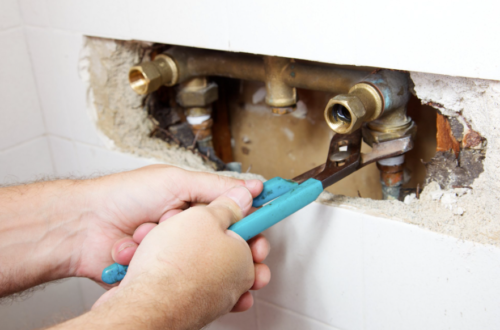Understanding Plumbing Codes and Regulations: A Comprehensive Guide for Homeowners
Introduction:
Plumbing is an essential component of any home, ensuring the proper functioning of water supply, drainage, and sewage systems. However, many homeowners are unaware of the intricate regulations and codes that govern plumbing installations. In this comprehensive guide, we will delve into the world of plumbing codes and regulations, providing homeowners with a deeper understanding of these vital aspects. Whether you are planning a new construction or renovating an existing property, familiarizing yourself with plumbing codes is crucial to ensure compliance, safety, and efficient plumbing systems.
I. What are Plumbing Codes and Regulations?
Plumbing codes and regulations are a set of standards established by local, state, and national authorities to safeguard public health, safety, and welfare. These codes dictate the minimum requirements for plumbing system installations, including design, materials, and maintenance. By adhering to plumbing codes, homeowners can ensure that their plumbing systems are safe, efficient, and environmentally friendly.
II. The Importance of Plumbing Codes and Regulations:
1. Safety: Plumbing codes prioritize the safety of occupants by ensuring that plumbing systems are designed and installed correctly. By following these codes, the risk of accidents, such as leaks, bursts, or contamination, is significantly reduced.
2. Health and Sanitation: Plumbing codes aim to protect public health by preventing the spread of disease-causing bacteria and ensuring the proper disposal of wastewater. Compliance with these regulations guarantees clean and sanitary water sources and efficient drainage systems.
3. Environmental Conservation: Plumbing codes also contribute to environmental conservation. By promoting water-efficient fixtures and systems, these regulations help reduce water waste and conserve this precious resource.
III. Common Plumbing Codes and Regulations:
1. Pipe Sizing and Material: Plumbing codes specify the appropriate pipe sizing and material based on factors such as water pressure, flow rate, and the type of plumbing system. Failure to comply with these regulations can result in inadequate water supply or compromised system integrity.
2. Ventilation: Proper ventilation is crucial for plumbing systems to prevent the buildup of harmful gases, such as methane and hydrogen sulfide. Plumbing codes outline the requirements for venting systems, ensuring the safe removal of gases and preventing potential health hazards.
3. Backflow Prevention: Backflow occurs when contaminated water flows back into the main water supply, compromising its quality. Plumbing codes mandate the installation of backflow prevention devices to safeguard public water sources from potential contamination.
4. Fixture Installation: Plumbing codes dictate the correct installation of fixtures, such as sinks, toilets, and showers, to ensure proper functionality and prevent leaks or blockages. These regulations address factors like spacing, accessibility, and the use of water-efficient fixtures.
5. Drainage and Waste Disposal: Proper disposal of wastewater is essential to maintain a safe and healthy environment. Plumbing codes provide guidelines for the design and installation of drainage systems, sewer connections, and septic tanks, ensuring efficient waste disposal and preventing environmental contamination.
IV. Frequently Asked Questions (FAQs):
1. Is it necessary to comply with plumbing codes for minor repairs or renovations?
Yes, plumbing codes apply to all plumbing system installations, including minor repairs and renovations. While the extent of compliance may vary based on the scale of the project, it is always recommended to consult local plumbing authorities or professionals to ensure adherence to relevant codes.
2. How can I find the plumbing codes and regulations applicable to my location?
Plumbing codes and regulations vary by jurisdiction. To identify the specific codes applicable to your area, contact the local building department or plumbing governing body. They can provide you with the necessary information and guidelines.
3. What happens if I fail to comply with plumbing codes?
Failure to comply with plumbing codes may result in penalties, fines, or even legal consequences. Moreover, non-compliant plumbing systems can pose safety risks, compromise water quality, and lead to costly repairs or replacements in the future. It is always advisable to prioritize code compliance to ensure the well-being of your household and property.
4. Can I undertake plumbing work myself or should I hire a professional?
Minor plumbing repairs or installations can often be performed by homeowners with basic plumbing knowledge. However, for complex projects or those requiring permits, it is advisable to engage a licensed and experienced plumber. They possess the expertise to navigate plumbing codes, ensuring proper installations and compliance.
Conclusion:
Understanding plumbing codes and regulations is crucial for homeowners to ensure the safety, efficiency, and compliance of their plumbing systems. By familiarizing themselves with these standards, homeowners can make informed decisions, minimize risks, and contribute to a healthier environment. Remember, when in doubt, consult professionals or local plumbing authorities to ensure adherence to the specific codes applicable to your area.
For further information on plumbing codes and regulations, you may refer to this comprehensive guide on [external link: Understanding Plumbing Codes and Regulations: A Comprehensive Guide for Homeowners].






